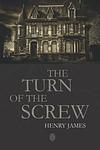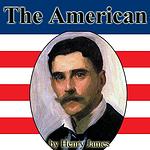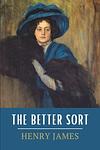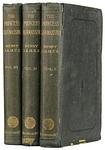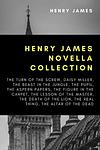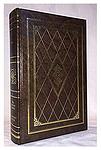Henry James
Henry James was an American author regarded as a key transitional figure between literary realism and literary modernism, and is considered by many to be among the greatest novelists in the English language. He was born on April 15, 1843, and died on February 28, 1916. His works often explore consciousness and perception from the viewpoint of a character within a story. Some of his most famous works include 'The Portrait of a Lady', 'The Turn of the Screw', and 'Daisy Miller'. His writing style has been influential and he has contributed significantly to the genre of psychological realism.
Books
This list of books are ONLY the books that have been ranked on the lists that are aggregated on this site. This is not a comprehensive list of all books by this author.
-
1. The Portrait of a Lady
This classic novel explores the life of a young, independent American woman who inherits a large amount of money and moves to Europe, where she falls into a manipulative and oppressive marriage. The story delves into themes of personal freedom, responsibility, and betrayal, as the protagonist navigates the complexities of high society, love, and the consequences of her choices.
-
2. The Ambassadors
The novel centers around a middle-aged man named Lambert Strether who is sent from New England to Paris by a wealthy widow, Mrs. Newsome, to convince her wayward son, Chad, to return home. However, upon arriving in Europe, Strether is charmed by the sophisticated lifestyle Chad has adopted and finds himself questioning the puritanical values of his homeland. He also becomes entangled in romantic relationships and complex social dynamics, leading him to ultimately question his loyalty to Mrs. Newsome. The book explores themes of morality, identity, and the concept of the American versus European lifestyle.
-
3. The Turn of the Screw
A young governess is hired to care for two children at a remote English estate. However, she soon becomes convinced that the grounds are haunted by two former employees who have taken control of the children. As she fights to free the children from these apparitions, the line between reality and her own fears becomes increasingly blurred, leading to a chilling and ambiguous conclusion.
-
4. Wings of the Dove
This novel centers around a young woman, Milly Theale, who is terminally ill and wealthy. She becomes the object of a conspiracy by two other characters, Kate Croy and Merton Densher, who are in love but too poor to marry. Kate manipulates the situation so that Densher becomes close to Milly, intending for him to marry her and inherit her wealth when she dies. However, Densher eventually falls in love with Milly, leading to a complex triangle of love, deceit, and moral ambiguity.
-
5. The Golden Bowl
The Golden Bowl is a complex narrative that revolves around an American woman and her daughter who marry a father and son. The daughter's husband previously had a romantic relationship with the mother's husband, leading to a tense and intricate web of relationships. The novel explores themes of marriage, adultery, and familial bonds, and is renowned for its detailed characterization and intricate plot structure.
-
6. Daisy Miller
"Daisy Miller" is a novella that explores the social differences between American and European society in the late 19th century. The story follows a young, affluent American woman named Daisy Miller, who defies societal norms while traveling in Europe. Her flirtatious behavior and disregard for European customs create a scandal among the upper-class expatriate community, particularly catching the attention of a young American man who is both attracted to and repulsed by her nonconformity. Ultimately, Daisy's refusal to conform to societal expectations leads to her downfall.
-
7. What Maisie Knew
The novel revolves around a young girl named Maisie, who becomes a pawn in the bitter divorce of her self-involved and neglectful parents. Her parents use her to hurt each other, and she is passed back and forth between them, their new spouses, and a sympathetic governess. Throughout the novel, Maisie navigates her way through a world of adult intrigue, betrayal, and selfishness, developing a mature understanding of human nature and relationships.
-
8. The American
"The American" is a novel about a wealthy, self-made American businessman who travels to Europe to find a wife. Despite his wealth and good nature, he struggles to navigate the complex and often hypocritical aristocratic society. His pursuit of a beautiful, young countess is met with resistance from her family due to his lack of noble lineage. The story showcases the clash between the New World's merit-based society and the Old World's class-based society.
-
9. The Bostonians
This novel is a satirical depiction of the post-Civil War feminist movement in Boston. The story revolves around a young feminist advocate, her conservative cousin, and a charming young man who wants to marry her. The novel explores themes of feminism, male dominance, and the battle between tradition and progress. It also provides a critical view of the era's political reformers and abolitionists.
-
10. The Spoils of Poynton
"The Spoils of Poynton" is a novel about a young woman named Fleda Vetch who becomes embroiled in a dispute over an impressive collection of art and antiques, known as the 'spoils', at the Poynton estate. Mrs. Gereth, the current owner of the spoils, wants to prevent her son Owen from inheriting them due to his engagement to a woman she deems unworthy. Fleda, who is in love with Owen, is caught in the middle of this conflict, leading to a dramatic exploration of morality, aesthetic appreciation, and the complexities of love and possession.
-
11. The Soft Side
This collection of short stories and essays showcases the author's exploration of the subtler aspects of human nature and relationships. Through a series of narratives, the work delves into the complexities of love, morality, and society, often focusing on the nuanced interactions between characters and the psychological underpinnings of their actions. The stories, set against a variety of backdrops, from the drawing rooms of high society to the more modest settings of everyday life, reveal the author's keen observation and deep understanding of the human condition, highlighting the 'soft side' of life's experiences and the intricate tapestry of emotions that define our existence.
-
12. The Tragic Muse
This novel explores the complex interplay between art, politics, and personal ambition through the lives of its characters, primarily focusing on Nick Dormer, who struggles between pursuing a career in politics and his true passion for painting, and Miriam Rooth, an aspiring actress determined to conquer the stage with her talent. Set against the backdrop of late 19th-century London and Paris, the narrative delves into themes of identity, societal expectations, and the sacrifices made for art and personal conviction. The characters' journeys are marked by their interactions with family, friends, and the societal elite, all of which influence their decisions and the paths they ultimately choose.
-
13. The Better Sort
This collection of short stories delves into the complexities of social interactions and moral dilemmas among the upper echelons of society, often referred to as "The Better Sort." Through a series of elegantly crafted narratives, the book explores themes of identity, personal integrity, and the nuanced dynamics of social class. The author masterfully employs his signature psychological depth and keen observation to portray the intricacies of human behavior and the subtleties of social conventions, revealing the underlying tensions and contradictions that exist within the seemingly polished and refined world of the elite.
-
14. The Awkward Age
The novel explores the complex dynamics of a blended family in late 19th-century London society. It centers around the young Nanda Brookenham, who is coming of age and becoming increasingly aware of her precarious social position. As her mother, Mrs. Brookenham, navigates the social scene to secure advantageous relationships for her daughter, Nanda finds herself entangled in a web of social expectations, romantic interests, and familial duties. The narrative delves into themes of innocence, manipulation, and the societal pressures faced by women, all while examining the intricate interplay between personal desires and the rigid structures of the upper-class social order.
-
15. The Princess Casamassima
The novel centers around the life of a young London bookbinder, Hyacinth Robinson, who is of obscure birth but intellectually gifted. His life becomes intertwined with that of a beautiful aristocrat, who introduces him to a world of radical politics and social reform. As he becomes more deeply involved with an underground revolutionary movement, he is torn between his loyalty to the cause and his attraction to the luxurious world of the upper class. This internal conflict leads him to a tragic decision, as he grapples with the complexities of class, politics, and his own identity.
-
16. Short Novels And Tales
"Short Novels and Tales" is a collection of narratives that delve into the complexities of human relationships, morality, and social dynamics through the lens of various protagonists, often from the upper echelons of society. The stories typically feature intricate psychological character studies and explore themes such as the conflict between Old World European values and New World American innocence, the intricacies of personal freedom, and the subtle interplay of social power and personal desire. The author's meticulous prose and nuanced understanding of character provide a rich, contemplative reading experience that examines the depths of human nature and the consequences of our choices.
-
17. The Beast in the Jungle
The novel revolves around a man who lives his life in fear of an unknown catastrophe, which he refers to as "the beast in the jungle". He spends his entire life waiting for this event, ignoring opportunities for love and happiness in the process. In the end, he realizes that the catastrophe he feared was the wasted potential of his own life, having spent it in anticipation of a disaster that never came.
-
18. Charles W. Eliot
This biography delves into the life and career of Charles W. Eliot, an influential figure in American education who served as the president of Harvard University for forty years. The book provides an in-depth look at Eliot's progressive educational philosophies, his efforts to transform Harvard into a leading research university, and his significant impact on American higher education. The author also explores Eliot's personal life, highlighting his character, values, and the experiences that shaped his approach to education.


